Is this the first time you are facing teething in your dog? Don’t worry. Teething is a totally natural phenomenon and there is no room for panic. This is a sensitive period in your pet’s life, and any help will be more than welcome.
A teething puppy is usually in discomfort, as it is facing inflamed gums, pain, or itchiness. In order to recognize the first tell-tale signs of puppy teething, you need to look into your puppy’s overall behavior.
Puppy teething symptoms are not unique for all puppies, as some dogs display unusual behavior during this period. However, there are eight ultimate teething symptoms that you can detect even if you are a first-time dog owner. Let’s take a look!
Puppy Teething Symptoms Explained
Puppy teething symptoms occur after the first two weeks of a puppy’s life.
During the first two weeks, puppies have no teeth, and they still have their eyes closed. In this stage of life make sure your puppy is next to its mother. Also, keep their crate warm and cozy. You need to maintain their body temperature between 35° and 37°.
The first incisors show up in the third week. They are followed by premolars and canines. There are a total of twenty-eight deciduous teeth in puppies. All of them grow by the end of the eighth week.
Deciduous teeth are also known as milk teeth, or baby teeth. They generally fall out by the end of the twelfth week of puppies’ lives.
Puppy’s adult teeth, or permanent teeth, grow during the late puppyhood phase. Generally, puppies have all of their 42 adult teeth by six months of age.
Early puppyhood is a phase in which you shouldn’t leave your puppy alone at home without any supervision. You need to be there in order to recognize the first puppy teething symptoms. Sometimes the teething process doesn’t go smoothly, and a vet’s help is more than welcome.
In order to understand puppy teething symptoms better, I have made a list of the eight most common teething symptoms that you can easily detect. Let’s take a ride!
1. Drooling
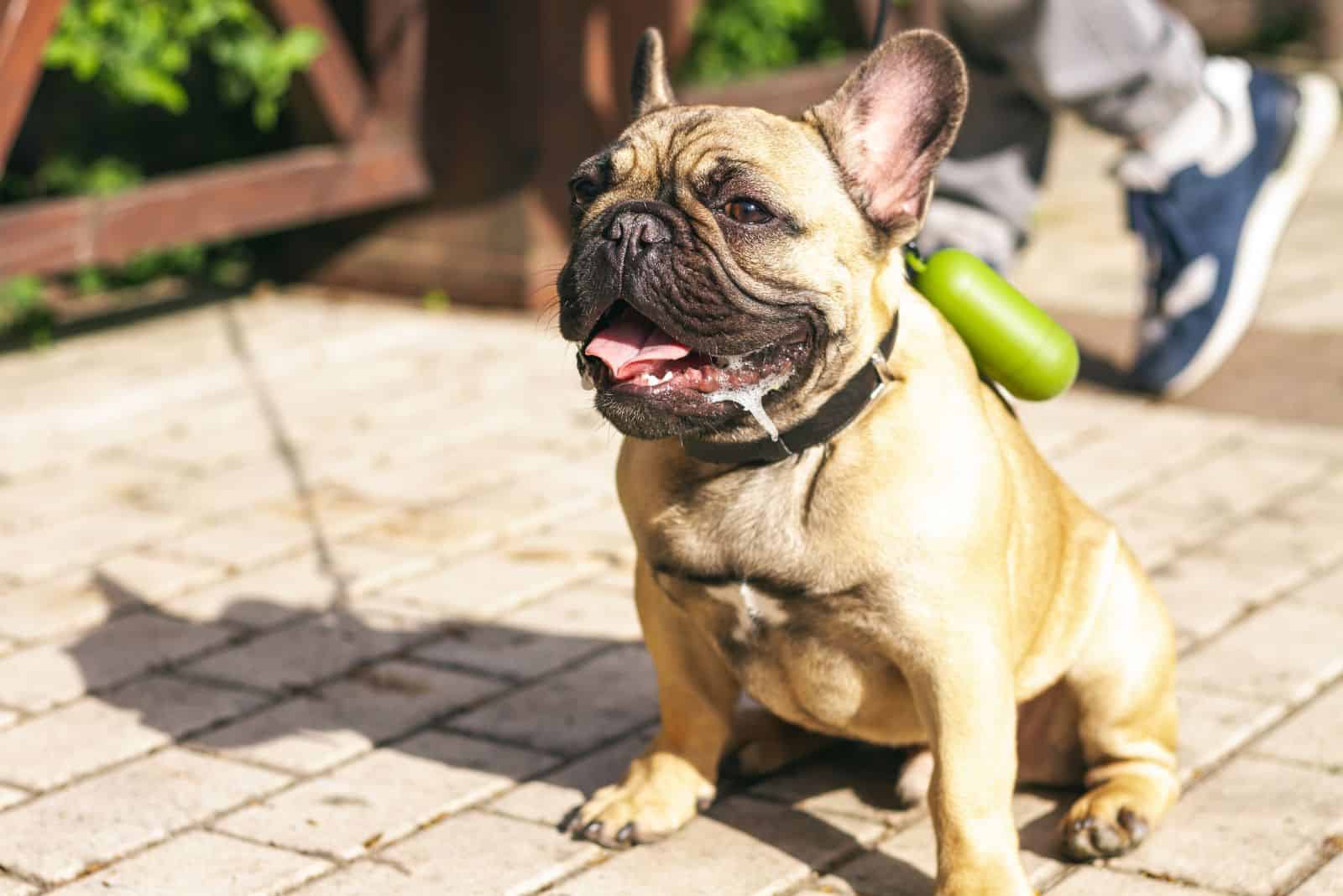
Even though dog drooling is common for many dog breeds, such as Bulldogs, Dogue De Bordeauxes, or Saint Bernards, this unpleasant habit is a phenomenon connected to puppies’ teething.
Drooling is a very common puppy teething symptom. Almost all puppies drool during the teething process. This is one of the first signs of future tooth growth, so be prepared!
The best thing you can do for your puppy is to purchase a chewing toy. Puppies slobber a lot during this stage of life. However, there are some home remedies for dog drooling that can help you reduce this phenomenon.
Chew toys are the best option! Chewing dog’s toys helps your puppy reduce stress during the teething period. Also, chewing reduces the drooling level, as breathing on the mouth dries your puppy’s mouth.
Another thing you can do is treat your dog with chamomile tea. Chamomile is safe for dogs, and it can be a great anti-stress therapy. Chamomile has a calming effect on dogs, which is something you need during the teething stage.
Drooling is an overwhelming symptom of puppy teething, but it doesn’t last forever. Make sure your canine gets adequate puppy toys and everything will be fine, sooner or later!
2. Nipping
Have you noticed that your puppy is excessively nipping, or gnawing your legs, or arms? Well, nipping, alongside excessive chewing can also be one of the puppy teething symptoms.
Puppies feel the need to chew and scratch their gums because they are in pain, or their gums are itchy. This is an unpleasant period of your puppy’s life, as these fur babies try to get rid of unusual feelings in their mouths.
Nipping is a natural instinct during the teething phase, which is why you need to provide your new puppy with a variety of chew toys. Make sure chew toys are age appropriate and that they fit your puppy’s mouth.
A dog’s breath can smell bad during this phase of life, too. If you notice an unpleasant smell from your puppy’s mouth, it can be due to puppy teething.
Early socialization training and obedience training are things that you need to adopt at the start. Don’t allow your puppy to chew or nip your hand, or legs. Puppies will adopt this sort of behavior as a way of playing, and they will keep biting you in the future.
If you don’t act timely, puppies will adopt nipping as approved behavior and keep on doing this even when they reach adulthood. Replace your arm with chew toys, or chew sticks.
Timely training and teaching your canine basic puppy manners are key for a well-behaved dog in the future.
3. Spots Of Blood
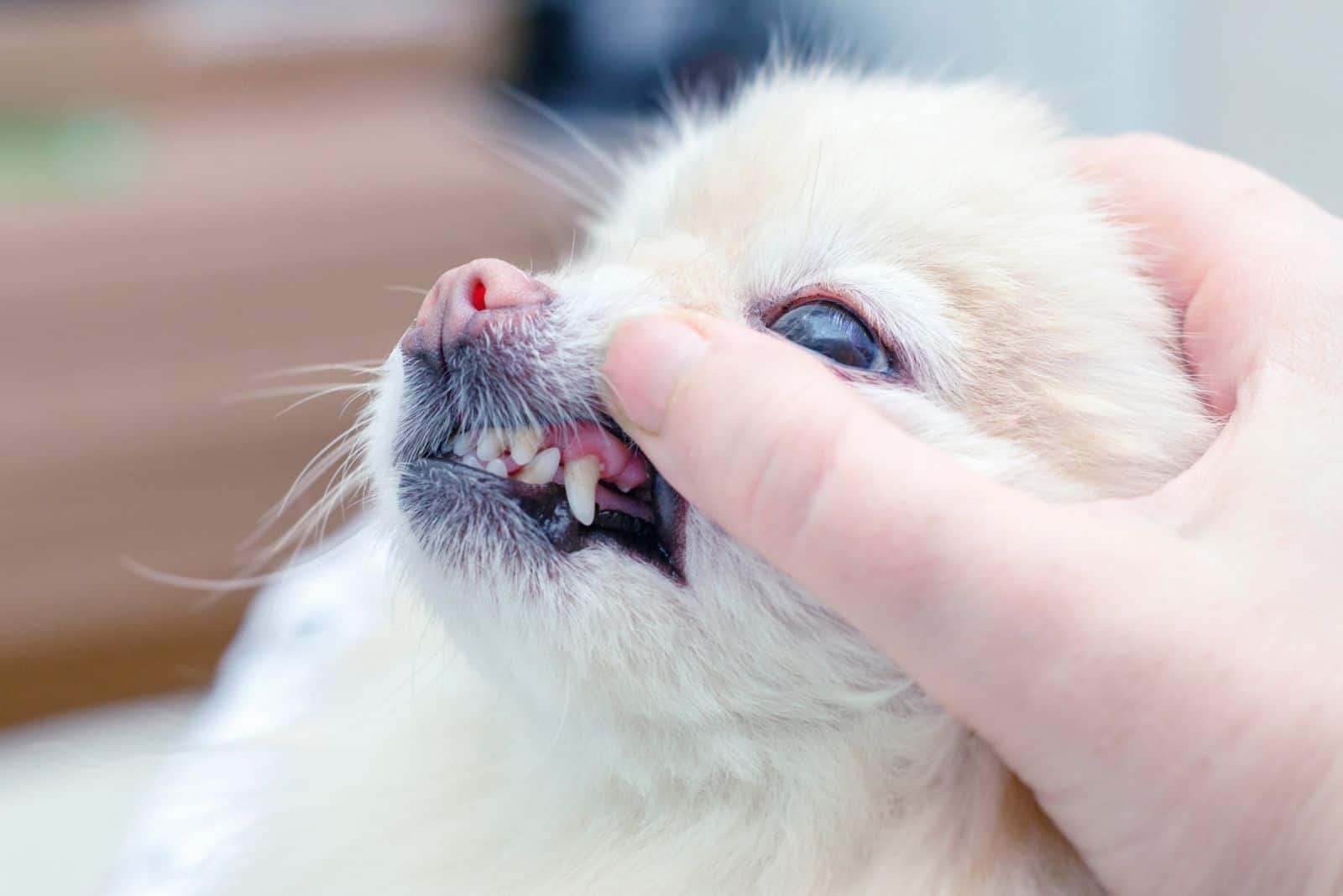
If you spot blood trails in your puppy’s gums, or mouth – it can be one of the puppy teething symptoms. However, you need to consult your vet if this happens, as blood can be a symptom of some other disease, or an injury.
Spots of blood in your puppy’s gums are not that rare, and they are perfectly normal. Puppies that are three, or four weeks of age face their first teething symptoms and they start chewing excessively.
Tooth loss can be an accompanying symptom in this case. You can find a puppy’s tooth on the floor as a result of excessive chewing.
Since their gums are still fragile and soft, puppies can cause bloody gums by excessive chewing. This is not a cause for panic. However, make sure your canine is subjected to a thorough and timely vet exam.
Dental care is one of the most important things for all dog breeds. A German Shepherd teething is not different from a Husky teething. All puppies go through the same process, which is naturally overwhelming and requires a lot of human attention.
Even once your puppy gets its first baby teeth, make sure you take good dental care of your dog.
4. Inflamed Gums
Inflamed gums, together with drooling, are probably among the most obvious symptoms of puppy teething. This is a painful symptom as puppies’ gums are sensitive, swollen, and irritable.
If you notice inflamed gums in your puppy, consult a vet about possible ointments that you can use in order to reduce the inflammation. Generally, this issue doesn’t last more than seven days. If, however, this phenomenon continues, visit a vet as soon as possible.
Inflamed gums can be the reason why your puppy refuses to eat.
Also, increased body temperature and fever could be accompanying symptoms of inflamed gums. This is common for human babies, too.
Don’t treat this condition on your own, especially if you’re planning to use antibiotics. Always take advice from a vet first.
Generally, newborn puppies that are less than eight weeks of age are energetic and mischievous. ‘‘When do puppies calm down’’ is a question all dog owners ask during the puppyhood phase.
Inflamed gums can make your puppy even more troublesome , as it causes a lot of pain and irritation.
However, they do eventually calm down once they surpass the ten-week milestone. After ten weeks they learn basic commands and start behaving properly.
5. Decreased Appetite
If you wonder, why your dog is acting weird all of a sudden – check out for the puppy teething symptoms! Puppies start acting strange once they face the first symptoms of puppy teething. For instance, new teeth can be the reason why your dog refuses to eat.
During this stage of life, a newborn puppy starts facing high amounts of pain, or itchiness. Painful gums are the reason why your puppy refuses to eat.
Decreased appetite can be a problem, though. This is a sensitive period in your puppy’s life, and it requires proper food intake. Puppies need to eat every few hours in order to keep their body weight within standards.
A vet consultation is the best thing you can do. Even though your puppy refuses to eat due to inflamed gums, or pain – not eating is not an option!
If you notice that your puppy doesn’t eat as much as it should, try to find alternative ways of feeding it. Also, avoid chew toys that are hard to chew for a puppy. Check out softer versions. Kong toys are an excellent option!
Hard chew toys can irritate your puppy’s gums even more. This causes a lot of stress and extra pain.
6. Mood Swings
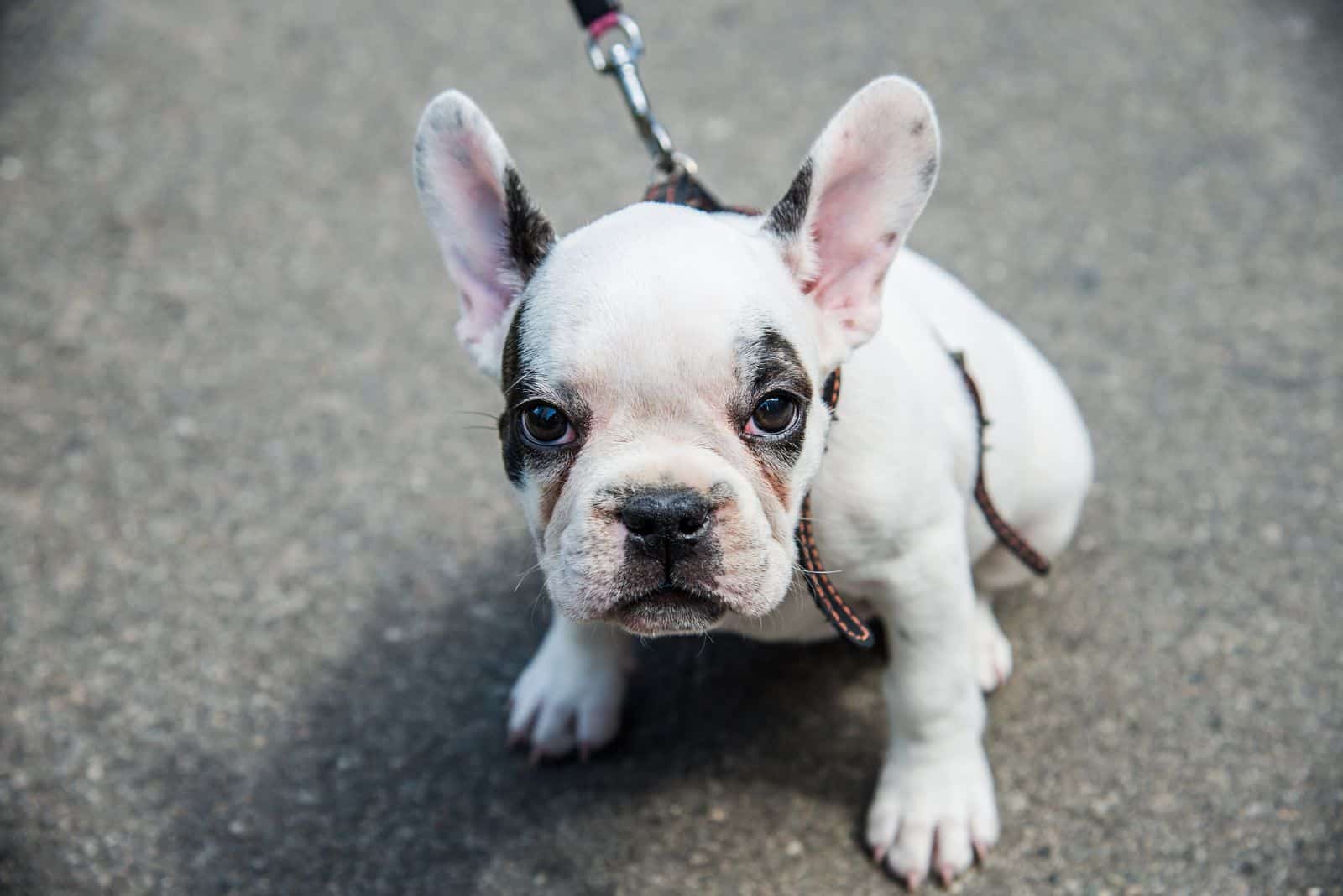
Have you noticed sudden mood swings in your puppy? In one moment, your canine is playful, but in the other, it is whining, or lacking energy. Yes. The puppy teething process is not that pawsome!
Mood swings are frequent during the early puppyhood phase, and the most common cause for that is puppy teething. There is not much to do in this kind of situation. Dog’s teeth are a sensitive topic that requires patience and a lot of understanding.
If you are a first-time dog owner, you may be confused by your puppy’s behavior. However, it is totally normal for puppies to be moody during the teething period.
The best thing you can do is to be at your puppy’s disposal. Create a cozy, nurturing environment and let your puppy be. However, don’t despair. Even though it may feel like your enigma of ‘‘when do puppies get easier’’ will never end – it eventually does.
7. Whining
‘‘Do dogs ever get tired of barking, or whining?” you ask. Well, that depends on the dog breed. For instance, Huskies are way more dramatic than American Staffordshire puppies. But one thing is for sure. Whining is a natural instinct in all dogs that go through puppy teething.
This is a completely natural phenomenon that doesn’t have to scare you. Dogs whine because they have an unpleasant feeling in their mouth. This is a new era in their lives, and they are naturally confused.
However, whining in puppies can be overwhelming for pet parents. There are some things you can do to help your puppy stop whining. Try to offer them a puppy chew toy. All dogs, especially puppies, love chewing toys!
This activity will reduce drooling and it will keep them occupied.
On the other hand, there are some puppies that prefer cuddling. Small dog breeds, such as Chihuahuas, Mini Cavapoos, or Pekingese puppies love being petted! Cuddling makes them relax and feel safe.
8. Lack Of Energy
This symptom can be confusing to many dog owners. Pet parents usually misunderstand their puppies’ lazy behavior. Even though your puppy belongs to a club of lazy dog breeds, you should try to understand why your puppy is lazy at the moment.
Lack of energy is common in a teething age. It is often accompanied by a lack of appetite, disinterest, mood swings, and whining.
This is a turbulent period for every puppy. Even though it can be really overwhelming, this is a natural process. If your puppy wants to lie down all day on the couch – let it do it. The worst thing you can do is push your canine.
Puppies in this stage need a lot of space for proper development. Most of the job is already done by their dog mom. Your job is to monitor their behavior and to provide them with a warm, cozy environment.
How Can I Help My Puppy With Teething Pain?
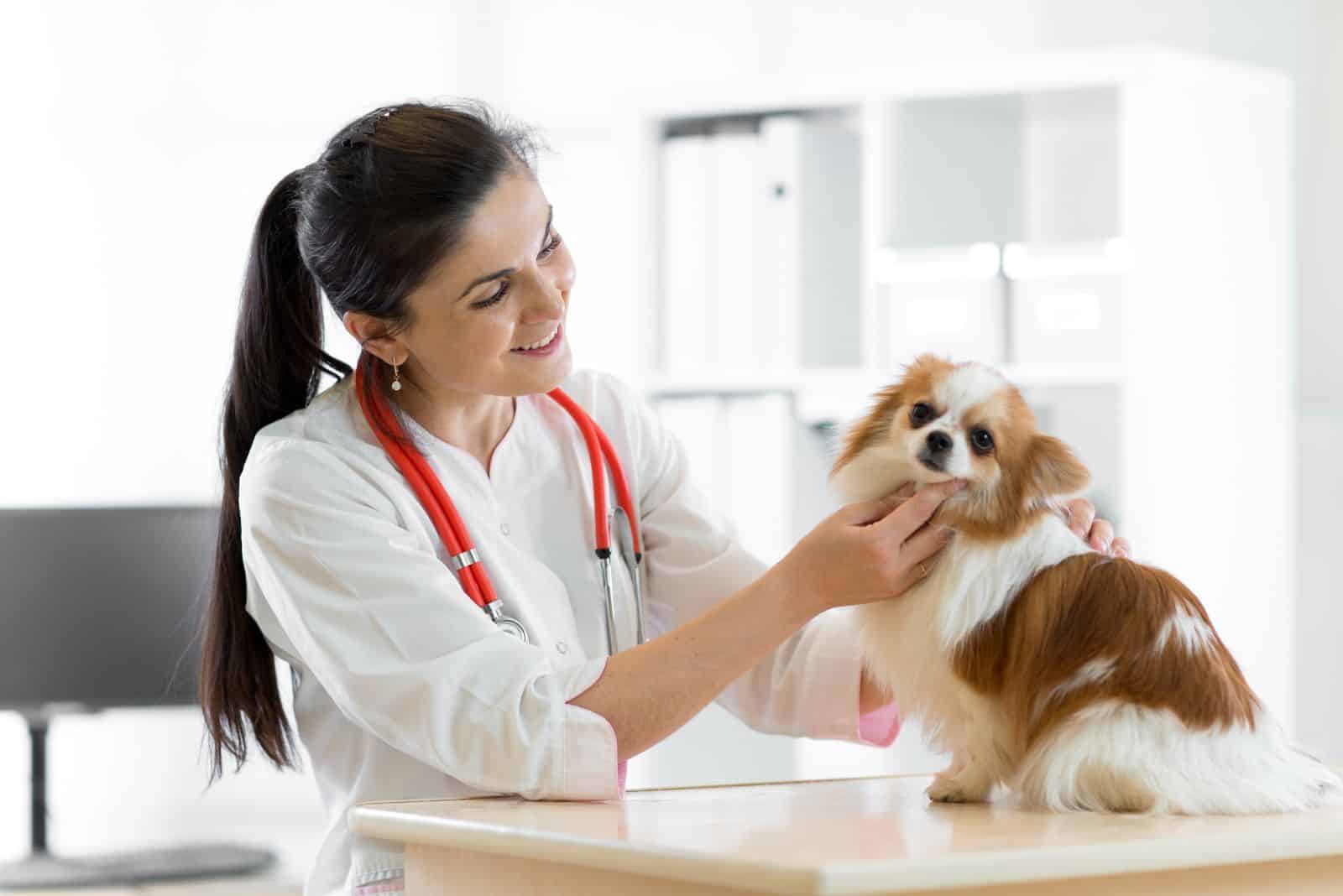
There are several things that you can do in order to help your teething puppy. The first and most important is to subject your puppy to a vet exam. Veterinarians will determine whether your puppy requires assistance during this turbulent period, or not.
Generally, puppies go through a teething period on their own. They don’t require any help from you. This is a natural process that goes smoothly, even though there are some symptoms that make the process painful at times.
Make sure you purchase a chew toy for your teething puppy. Puppy chew toys are an excellent choice in case your puppy drools, or nips.
Also, you can use chamomile tea as anti-stress therapy for your puppy’s gums. Chamomile is a great way to make your puppy relaxed and to reduce the pain they may feel during this period.
There is not much to do other than be there for your puppy. This process doesn’t require much assistance, as puppies instinctively know how to deal with teething.
You need to know that teething has a plethora of unusual symptoms that shouldn’t make you worry. For instance, if your dogs keep licking their lips, or chewing anything that comes into its mouth – don’t worry. It’s teething time!
Frequently Asked Questions
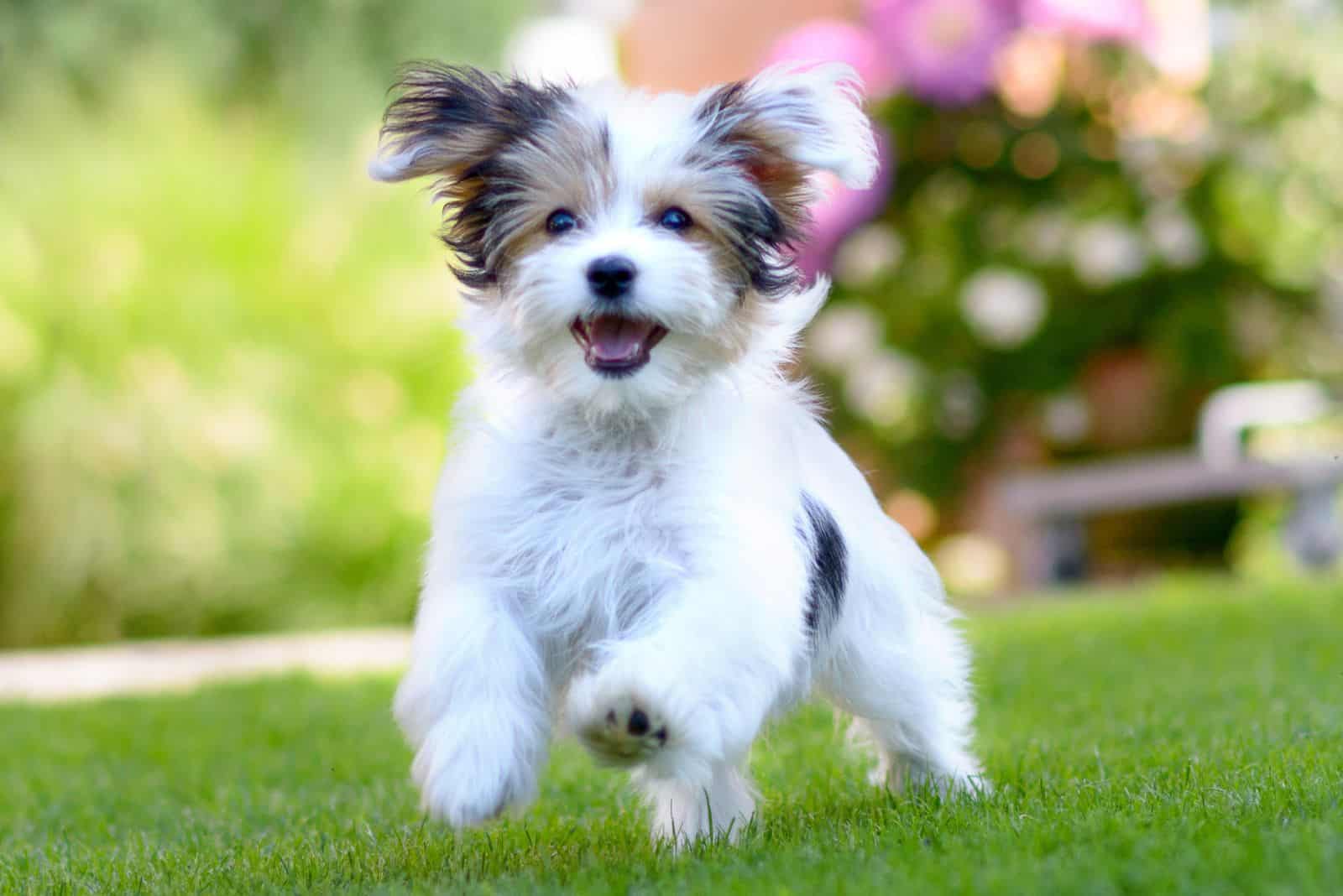
Generally, teething starts after the first two weeks of a puppy’s life. Deciduous teeth fall out by the time a puppy turns twelve weeks. Generally, a puppy’s adult teeth grow by the end of the sixth month.
This is a general timeframe for all dog breeds. However, some puppies get their first teeth sooner, or later.
Small deviations shouldn’t be worrying. Teething is a painful process that comes with many symptoms. Mood swings, lack of energy, lack of appetite, or disinterest are completely normal.
If you are wondering why your dog is sleeping under the bed – the answer might just be teething.
Dogs seek a calm, nurturing environment during this period.
The important thing, though, is to keep the dental care of your puppy on a high level. Regular usage of toothpaste and a toothbrush will reduce the possibility of tartar build-up on your puppy’s teeth.
Swelling is a pretty common symptom of teething. Inflamed and swollen gums are one of the most common symptoms of puppy teething.
Generally, dogs are in a very vulnerable place during this period. If you notice that your dog cries when carrying toys, or chewing food, the reason might just be – teething!
Gums in dogs are extremely irritable during puppyhood. It is common to see spots of blood in your puppy’s mouth due to irritation, or excessive chewing.
In order to mitigate these symptoms, you can use chamomile, natural ointments, or some other vet-approved supplements that will help your puppy go through the teething period easily.
Conclusion
There are some pretty obvious puppy teething symptoms, such as drooling, nipping, spots of blood, or inflamed gums. Dog owners use these symptoms to identify whether their canine is going through this painful process, or not.
However, there are some behavioral changes that might indicate your puppy is going through this transitional period.
Generally, puppies become moody and disinterested, and they lack appetite, or they refuse to eat at all. Every puppy’s symptoms are relative and they are manifested differently.
The advice is to regularly visit and consult your vet about possible symptoms and how to help your puppy go through this process as painlessly as possible.
This is a perfectly natural process that happens to all dog breeds. Your job is to monitor your puppy’s development and to jump in when needed.
Read more: 11 Reasons Why Is Dog Suddenly Eating Grass Like Crazy
